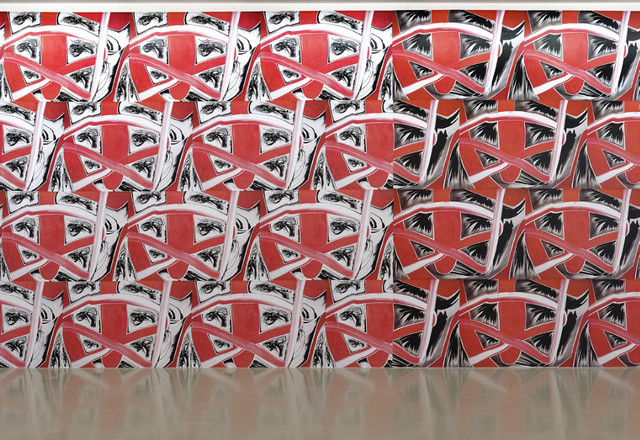The IAC presents, in collaboration with WIELS Contemporary Art Centre in Brussels, Museo MADRE in Naples and the BALTIC Centre for Contemporary Art in Gateshead, the first major retrospective of German artist Thomas Bayrle in France. All-in-One brings together over two hundred works from throughout his career, from the early 1960s to his most recent pieces that were specifically produced for the Institut d'art contemporain.
The exhibition All-in-One brings together a set of works spanning his important periods and showcasing the variety of techniques used by Thomas Bayrle, from his early kinetic machines to his collages, paintings, wallpapers, films, graphic output and publications; from his sculptures and utopian and dystopian architectural models to his most recent mechanical installations.
At the crossroads of Pop, Serial and Optical art, Thomas Bayrle has developed a singular visual language liaising experimentation and subversion. A major artist in Germany who has long been recognized in the international art world, Thomas Bayrle exerts an influence that has shaped an entire generation of artists, through his role as a professor at Städelschule Art School in Frankfort (from 1975 to 2002); through his work as a graphic designer, notably in the field of publishing (he cofounded Gulliver Press in 1960); and through his involvement in a number of prestigious international art exhibitions (Documenta 3, 6, and 13, the 50th Venice Biennale...).
During the Cold War period in the 1960s, Thomas Bayrle began a body of work that integrated both capitalist and communist symbols and questioned the mechanisms of communication and image production in mass society. Influenced by his immediate environment in Frankfurt - including the Institute of Social Research (later called the Frankfurt School) whose critical theory confronted philosophy, history and sociology with Marxist teachings and psychoanalysis - Thomas Bayrle adopted an anti-establishment attitude, subverting conventional codes of advertising. Through the repetition of a single, unique motif, he would generate images close to Pop art and Op art. He shared with the American Pop art movement an interest in social life and consumer culture but his approach was less aestheticized, more political. His visual research thus extended to more politically charged
social themes such as traffic patterns and urban sprawls. Through the threading and weaving techniques that serve as the basis for many of his pieces, he creates a form of unity in multiplicity with a visual and formal language all his own.
From the beginning of his work, Thomas Bayrle has never ceased to question the values and norms of political and economic systems by examining social issues such as the economy, architecture, sexuality and religion. In today's global context, his work puts into perspective a system in which individual elements can only be defined by their relationship to other elements, through a process of fragmentation, constant shifts in scale and the interconnections between the micro and the macro. In other words, and in the words of advertisers: the All-in-One.
This Thomas Bayrle solo show, as well as those of Bernard Bazile, François Curlet and Jef Geys and the group show Yes We Don’t, are all part of the IAC's ongoing exploration of the critical and subversive thinking that runs through a variety of artistic approaches, from image infiltration techniques to formal deviation or distortion.
At the crossroads of Pop, Serial and Optical art, Thomas Bayrle has developed a singular visual language liaising experimentation and subversion. A major artist in Germany who has long been recognized in the international art world, Thomas Bayrle exerts an influence that has shaped an entire generation of artists, through his role as a professor at Städelschule Art School in Frankfort (from 1975 to 2002); through his work as a graphic designer, notably in the field of publishing (he cofounded Gulliver Press in 1960); and through his involvement in a number of prestigious international art exhibitions (Documenta 3, 6, and 13, the 50th Venice Biennale...).
During the Cold War period in the 1960s, Thomas Bayrle began a body of work that integrated both capitalist and communist symbols and questioned the mechanisms of communication and image production in mass society. Influenced by his immediate environment in Frankfurt - including the Institute of Social Research (later called the Frankfurt School) whose critical theory confronted philosophy, history and sociology with Marxist teachings and psychoanalysis - Thomas Bayrle adopted an anti-establishment attitude, subverting conventional codes of advertising. Through the repetition of a single, unique motif, he would generate images close to Pop art and Op art. He shared with the American Pop art movement an interest in social life and consumer culture but his approach was less aestheticized, more political. His visual research thus extended to more politically charged
social themes such as traffic patterns and urban sprawls. Through the threading and weaving techniques that serve as the basis for many of his pieces, he creates a form of unity in multiplicity with a visual and formal language all his own.
From the beginning of his work, Thomas Bayrle has never ceased to question the values and norms of political and economic systems by examining social issues such as the economy, architecture, sexuality and religion. In today's global context, his work puts into perspective a system in which individual elements can only be defined by their relationship to other elements, through a process of fragmentation, constant shifts in scale and the interconnections between the micro and the macro. In other words, and in the words of advertisers: the All-in-One.
This Thomas Bayrle solo show, as well as those of Bernard Bazile, François Curlet and Jef Geys and the group show Yes We Don’t, are all part of the IAC's ongoing exploration of the critical and subversive thinking that runs through a variety of artistic approaches, from image infiltration techniques to formal deviation or distortion.


